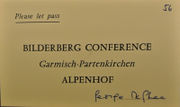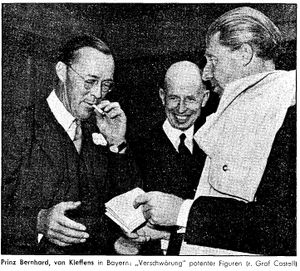Difference between revisions of "Bilderberg/1955 September"
(EU/DS) |
|||
| Line 12: | Line 12: | ||
|witnesses=Terence Airey, Frank Darvall, E. G. Focke, G. Gather, F. A. De Graaf, H. J. Kruls, John Pomian | |witnesses=Terence Airey, Frank Darvall, E. G. Focke, G. Gather, F. A. De Graaf, H. J. Kruls, John Pomian | ||
}} | }} | ||
| − | The '''September 1955 Bilderberg Meeting''' was the third [[Bilderberg]] meeting and the second one that year. It had participants from 11 [[Europe]]an countries, the [[United States]] and [[Canada]]. All were male.<ref name=bb195509report>[[File:Bilderberg-Conference-Report-1955-2.pdf]]</ref> It was held at Garmisch-Partenkirchen in [[Germany]].<ref name=bb195509report/> {{Bilderberg summary}} The second Bilderberg meeting that year (after the [[Bilderberg/1955 March]] conference) it was the subject of a report by ''[[Der Spiegel]]'', which was the most informative such report in the {{ccm}} for years, perhaps decades. The next meeting was the [[1956 Bilderberg]], which | + | The '''September 1955 Bilderberg Meeting''' was the third [[Bilderberg]] meeting and the second one that year. It had participants from 11 [[Europe]]an countries, the [[United States]] and [[Canada]]. All were male.<ref name=bb195509report>[[File:Bilderberg-Conference-Report-1955-2.pdf]]</ref> It was held at Garmisch-Partenkirchen in [[Germany]].<ref name=bb195509report/> {{Bilderberg summary}} The second Bilderberg meeting that year (after the [[Bilderberg/1955 March]] conference) it was the subject of a report by ''[[Der Spiegel]]'', which was the most informative such report in the {{ccm}} for years, perhaps decades. |
| + | |||
| + | ==Group size research== | ||
| + | The organisers of the Bilderberg were apparently conducting research on how group size would affect the meetings, since the smallest ever Bilderberg, just 42 guests, was held that March, while the next meeting was the [[1956 Bilderberg]], which at 147 guests was possibly the largest ever. | ||
==Agenda== | ==Agenda== | ||
| Line 21: | Line 24: | ||
===4. The Reunification Of Germany === | ===4. The Reunification Of Germany === | ||
===5. European Unity === | ===5. European Unity === | ||
| + | The promotion of supranational group as part of a [[European Deep State]], dominated by Bilderberg members, would be a permanent part of the Bilderberg agenda. | ||
===6. The Industrial Aspects Of Atomic Energy=== | ===6. The Industrial Aspects Of Atomic Energy=== | ||
===7. Economic Problems=== | ===7. Economic Problems=== | ||
Revision as of 16:15, 7 May 2021
The September 1955 Bilderberg Meeting was the third Bilderberg meeting and the second one that year. It had participants from 11 European countries, the United States and Canada. All were male.[1] It was held at Garmisch-Partenkirchen in Germany.[1] The 78 guests included 19 business executives, 25 politicians, 4 financiers, 2 editors/journalists and 6 academics. The second Bilderberg meeting that year (after the Bilderberg/1955 March conference) it was the subject of a report by Der Spiegel, which was the most informative such report in the commercially-controlled media for years, perhaps decades.
Contents
- 1 Group size research
- 2 Agenda
- 2.1 1. Review of Events since the Barbizon Conference
- 2.2 2. Article 2 of The North Atlantic Treaty Organization
- 2.3 3. The Political And Strategic Aspects Of Atomic Energy
- 2.4 4. The Reunification Of Germany
- 2.5 5. European Unity
- 2.6 6. The Industrial Aspects Of Atomic Energy
- 2.7 7. Economic Problems
- 3 Exposure
- 4 Press Statement
- 5 Known Participants
- 6 Witnesses
- 7 Related Document
- 8 References
Group size research
The organisers of the Bilderberg were apparently conducting research on how group size would affect the meetings, since the smallest ever Bilderberg, just 42 guests, was held that March, while the next meeting was the 1956 Bilderberg, which at 147 guests was possibly the largest ever.
Agenda
The Agenda of the October 1955 Bilderberg has been leaked and is now online.[1]
1. Review of Events since the Barbizon Conference
2. Article 2 of The North Atlantic Treaty Organization
3. The Political And Strategic Aspects Of Atomic Energy
4. The Reunification Of Germany
5. European Unity
The promotion of supranational group as part of a European Deep State, dominated by Bilderberg members, would be a permanent part of the Bilderberg agenda.
6. The Industrial Aspects Of Atomic Energy
7. Economic Problems
East-West Trade
The Political Aspects Of Convertability
Expansion Of International Trade
Exposure

The edition of Der Spiegel of 5 October 1955 contained a report of over 2 pages about the "Secret Conference", which named over a dozen of the participants.
Press Statement
The meeting report contains a half page press statement.
Known Participants
75 of the 78 of the participants already have pages here:
| Participant | Description |
|---|---|
| Otto Wolff von Amerongen | Bilderberg Advisory Committee member, deep politician |
| George Ball | US deep politician who attended all 40 Bilderberg meetings up to his death, he helped make key decisions about post-WW2 Europe. |
| Victor Cavendish Bentinck | Chairman of the Joint Intelligence Committee, diplomat, 7 Bilderbergs |
| Fritz Berg | President of the Federation of German Industries - "the real government of West Germany" - for over 20 years. 13 Bilderbergs. |
| Bernhard von Biesterfeld | Nazi arms dealer. Alleged bodyguard of Hitler, early member of the SS, requested presidency under Hitler during WW2. An early leader of the Dutch Deep State, founded Dutch division of Operation Gladio named Inlichtingen en Operatiën, co-founded Bilderberg as Steering Committee chairman. Started 1001 Club, WWF, Rijkens Club. Linked to Klaas Bruinsma. |
| Barry Bingham | Kentucky media owner who collaborated with British Security Coordination. Attended 3 Bilderbergs in the 1950s. Ran the Marshall Plan in France in 1949. |
| Pierre Bonvoisin | Attended the first Bilderberg and three more. Société Générale de Belgique. Councilor to King Baudouin. Father of Benoît de Bonvoisin |
| Max Brauer | Mayor of Hamburg. One of a dozen men whom Józef Retinger consulted when setting up the Bilderberg |
| Fraser Bruce | Canadian aluminum executive who attended 3 early Bilderberg meetings. |
| Carl Burckhardt | President of the International Committee of the Red Cross (1945–48), where he assisted Germans wanted for war crimes escape to South America. September 1955 and 1956 Bilderberg meetings. |
| Anthony Buzzard | Director of UK Naval Intelligence from 1951-1954. Attended the 3rd and 4th Bilderbergs after retiring |
| Louis Camu | Belgian atlanticist banker and multi-Bilderberger. Proponent of European unification and creating a single European currency. |
| Hakon Christiansen | Danish businessman. Bilderberg Steering committee. |
| Walker Cisler | As well as the first Bilderberg, he attended the next four, and 3 more in the early 1960s, US businessman |
| René Clement-Cuzin | Attended 2 Bilderbergs in the 1950s. Little known, possibly an economist. |
| Geoffrey Crowther | Attended the Bilderberg in the 1950s twice as Editor of the Economist |
| Joseph Dodge | US financier and economic advisor who worked on the financial restructuring of Germany after World War II. Attended the 3rd and 4th Bilderbergs |
| Jean Drapier | Principal Private Secretary to Belgian Prime Minister Paul-Henri Spaak, went to 3 of the first 4 Bilderbergs |
| Fritz Erler | SPD Deputy chair. Attended all Bilderberg meetings from 1955 September to his death in 1967, aged 53 |
| Amintore Fanfani | Quad bilderberger, Italian PM |
| John Ferguson | US lawyer, attended the first Bilderberg and 7 others in the 1950s. US Ambassador to Morocco 1962-64 |
| Ralph Flanders | Chairman of Federal Reserve Bank of Boston who attended two Bilderbergs in the 1950s. |
| C. J. Geddes | British trade union leader who later was knighted |
| Clinton Golden | Anti-communist labor union leader. Double Bilderberger |
| Herbert Gross | Writer for the Nazi magazine Das Reich who in 1946 founded the Handelsblatt. One of the first to fundamentally deal with public relations on a programmatic level in post-war West Germany. Attended the 3rd and 4th Bilderbergs. |
| Walter Hallstein | Taken prisoner by the Americans in June 1944, where he was selected for special training as part of "Project Sunflower", a reeducation plan for possible future decision-makers. Became one of the founding fathers of the European Union. Multi-Bilderberg |
| Gabriel Hauge | Early member of the Bilderberg Steering committee, CFR. "The expert who tells [President Eisenhower] what to think" |
| Jens Christian Hauge | Bilderberg Steering Committee, Pivotal Norwegian deep politician post-WWII |
| Denis Healey | Bilderberg Steering committee member, who attended 23 Bilderberg meetings. |
| Paul Hoffman | Five time early Bilderberger, UNDP administrator |
| John Hope | Scottish aristocrat and Tory politician. |
| H. John Heinz II | 34 Bilderberg meetings, Bilderberg Steering & Advisory Committees |
| Hastings Ismay | Ex Secretary General of NATO. |
| Douglas Jay | UK politician |
| Joseph Johnson | Inaugural US secretary of the annual Bilderberg, Bilderberg Steering committee member. |
| P. J. Kapteyn | Attended two Bilderbergs in the 1950s. |
| George Kennan | Suspected US deep politician, member of the Georgetown Set |
| Kurt Georg Kiesinger | Five early Bilderbergs, German Chancellor. Possible tool of the BND |
| E. N. van Kleffens | Dutch Bilderberger, heavy Bilderberg habit, President of the United Nations General Assembly 1954-55 |
| Ole Bjørn Kraft | A Danish conservative politician whom Józef Retinger consulted when setting up the Bilderberg group |
| Sjur Lindebrække | «Father of the modern Norwegian Conservative Party» who persuaded it to support NATO. Attended September 1956 and 1956 Bilderberg meetings. |
| Giovanni Malagodi | Italian liberal politician and supporter of European unity under American guiding hand. Attended the first Bilderberg and 8 others. |
| Robert Marjolin | French economist/civil servant involved in the Marshall Plan and the formation of the European Economic Community. |
| Reginald Maudling | UK politician, Chancellor of the Exchequer, Bilderberg Steering committee |
| George McGhee | US ambassador, spook, Committee on the Present Danger, 12 Bilderbergs in the 1950s and 60s. |
| Alexander Menne | Transatlantic German politician (FDP) and industrial manager who attended 3 Bilderbergs in the 1950s. |
| Fritz Molden | Austrian journalist, publisher, diplomat who attended 2 Bilderbergs in the 1950s |
| Guy Mollet | One of a dozen men whom Józef Retinger consulted when setting up the Bilderberg group |
| Roger Motz | Belgian politician who attended 4 Bilderberg meetings in the 1950s, including the first one. |
| Rudolf Mueller | Consulted by Józef Retinger when setting up the Bilderberg group |
| ... further results | |
Witnesses
| Witness | Description |
|---|---|
| Terence Airey | Early Bilderberg Steering committee. UK soldier |
| Frank Darvall | UK labour leader who attended 3 Bilderbergs in the 1950s |
| E. G. Focke | In attendance at the first Bilderberg and two further Bilderbergs |
| G. Gather | Unknown German visitor to the third Bilderberg meeting |
| Frans A. de Graaf | Private secretary of Prince Bernhard |
| H. J. Kruls | Explosive Dutch general during World War 2. Trusted liaison of Prince Bernhard, former head advisor for the board of directors of KLM. Bilderberger. |
| John Pomian | Multi-Bilderberg Polish nobleman who settled in the UK |
Related Document
| Title | Type | Publication date | Author(s) | Description |
|---|---|---|---|---|
| File:Bilderberg-meetings-report-1955.pdf | report | A summary of the 1955 Bilderberg meeting that took place from September 23-25 at the Grand Hotel Sonnenbichl in Garmisch-Partenkirchen, West Germany. |
